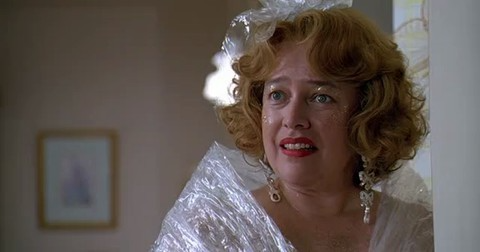
The Build-Up of Silent Frustration
From the beginning of Fried Green Tomatoes, Evelyn Couch is a woman tightly bound by the expectations of others. A southern housewife in late middle age, Evelyn is overweight, overlooked, and dismissed—by her husband, by society, and most painfully, by herself. Her days are filled with Weight Watchers meetings, ignored advice, and an emotionally unavailable spouse. Evelyn’s cheerful but insecure demeanor masks decades of silent acquiescence.
The pressure inside her builds slowly. Her visits to the nursing home with her husband—where she meets the elderly Ninny Threadgoode—are an accidental doorway into another world. Ninny’s stories about Whistle Stop, Idgie, and Ruth awaken something long buried inside Evelyn: a desire to live more boldly, more honestly, and more joyfully.
But real change doesn’t happen overnight. For a long time, Evelyn remains stuck between the person she was taught to be and the woman she might yet become. And then, something snaps.
The Parking Lot Incident: A Turning Point
In one of the film’s most iconic and cathartic scenes, Evelyn pulls into a grocery store parking lot and patiently waits for a spot. Just as she’s about to take it, a red sports car whips in and steals the space. Two young women laugh, flip their hair, and mock her with a dismissive “Face it, lady—we’re younger and faster.”
Evelyn, usually submissive, stares in disbelief. And then, for the first time in her life, she doesn’t take it. She throws her car into gear, slams into the red car not once, but multiple times, crunching its metal and setting off alarms.
When the horrified young women rush back, Evelyn calmly rolls down her window and says the now-famous line: “Tawanda!”
This isn’t just a moment of comedy—it’s a seismic shift in Evelyn’s character. It’s rebellion. Liberation. Power reclaimed.
Tawanda! More Than a Battle Cry

The word “Tawanda” doesn’t have a dictionary definition, but in Evelyn’s world, it becomes her personal symbol of transformation. It’s the alter ego she invents—a warrior version of herself who’s brave, loud, assertive, and unafraid.
Shouting “Tawanda!” as she crashes into the car is Evelyn’s way of declaring her freedom. It’s a moment of physical chaos that mirrors the emotional revolution happening inside her. It’s not just about the parking space. It’s about every time she was passed over. Every time she was told to smile and be quiet. Every time she was told she wasn’t enough.
This moment may be funny, but it’s also profound. It represents the reclaiming of space—not just physical, but emotional and psychological.
A Quiet Revolution in Motion
After the parking lot rebellion, Evelyn doesn’t instantly become a new woman. She still has work to do. But something essential has shifted. She starts standing up to her husband. She pursues new relationships. She begins to take real steps toward independence—not with rage, but with quiet confidence.
What’s most beautiful about this arc is that Evelyn doesn’t change into someone else—she becomes more fully herself. She stops minimizing her needs. She learns to say no. She starts making choices based on desire, not fear. That’s the true rebellion.
The Feminist Heart of the Scene
While Fried Green Tomatoes isn’t an overtly political film, it is profoundly feminist in its portrayal of women’s lives—especially women of a certain age. Evelyn’s parking lot explosion may seem like a punchline, but in the broader context of the film, it’s a battle cry for countless women who feel erased.
Women like Evelyn are told they must age gracefully, quietly, invisibly. But Evelyn breaks that mold—quite literally. She claims her rage, her joy, her power. And she does it without becoming cruel or cold. She simply decides that her life is worth more than polite suffering.
Audience Resonance: Why It Endures
The “Tawanda” scene has become iconic, quoted and referenced decades after the film’s release. Why? Because it taps into a universal longing—for justice, for respect, for the right to take up space in the world.
Viewers cheer not just because it’s funny, but because it’s righteous. Evelyn’s outburst is a mirror held up to anyone who’s ever been overlooked, underestimated, or pushed aside.
It’s wish fulfillment, yes. But it’s also a roadmap: You can change. You can push back. You can become the hero of your own story.
A Ripple Through the Rest of the Film
After this scene, Evelyn is different. More confident, more joyful, more present. She doesn’t become a completely different person—she becomes more honest about who she’s always been.
This change affects every relationship in her life. She no longer accepts the bare minimum from her husband. She starts dreaming about owning a business. And most importantly, she offers Ninny not just friendship, but a home—a reversal of their initial dynamic.
In helping Evelyn reclaim herself, Ninny changes the future. And in saying “Tawanda,” Evelyn finally writes her own story.
Conclusion: A Crash of Transformation
The parking lot scene in Fried Green Tomatoes is many things: hilarious, iconic, surprising. But most of all, it’s deeply human.
It captures the exact moment a person stops apologizing for existing.
Evelyn Couch, once timid and ignored, shouts into the world: “I matter. I am here. And I will not be pushed aside.”
The echo of that moment resonates far beyond the screen. And in every woman who has ever muttered “Tawanda!” under her breath, Evelyn lives on.
